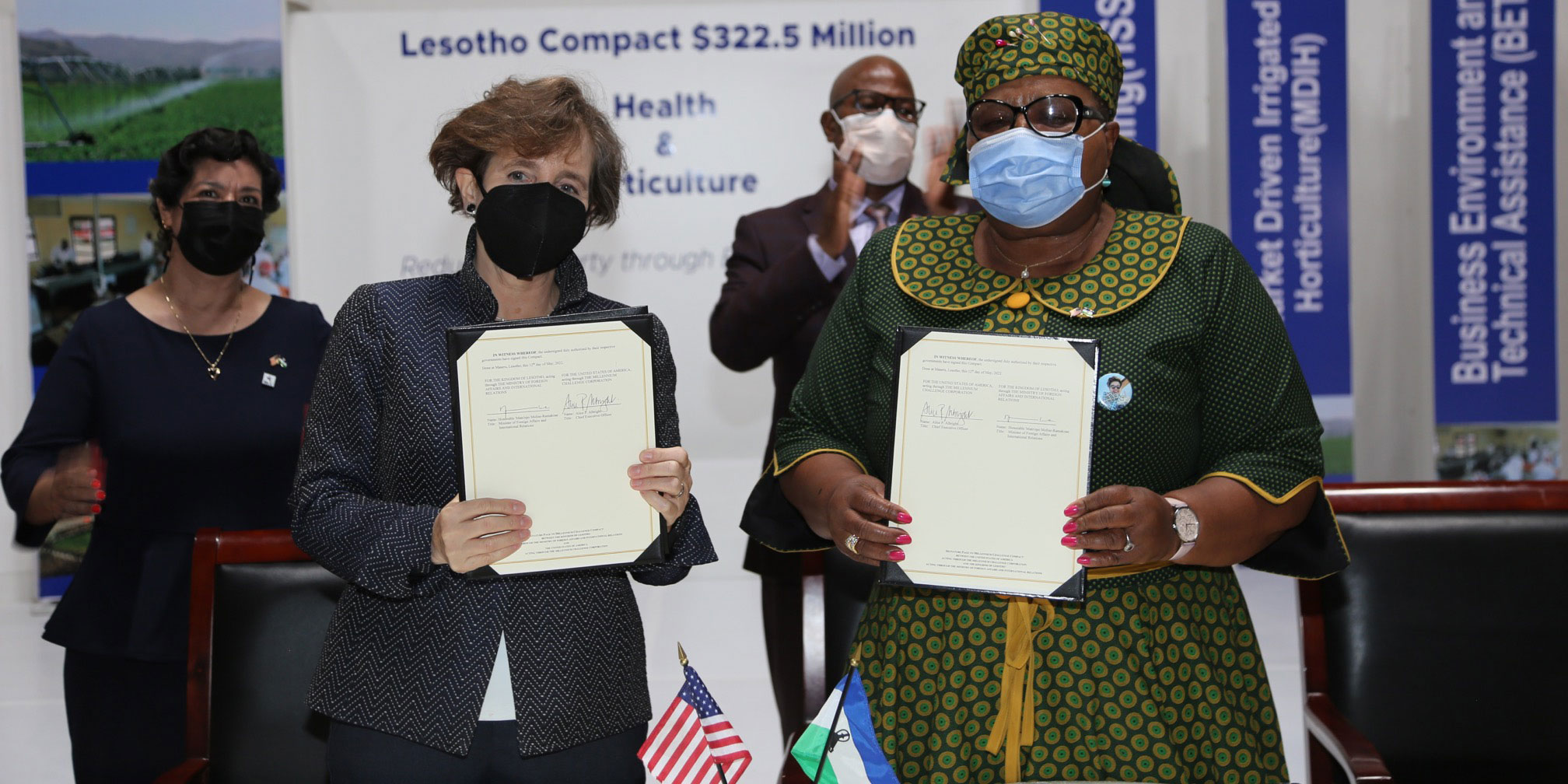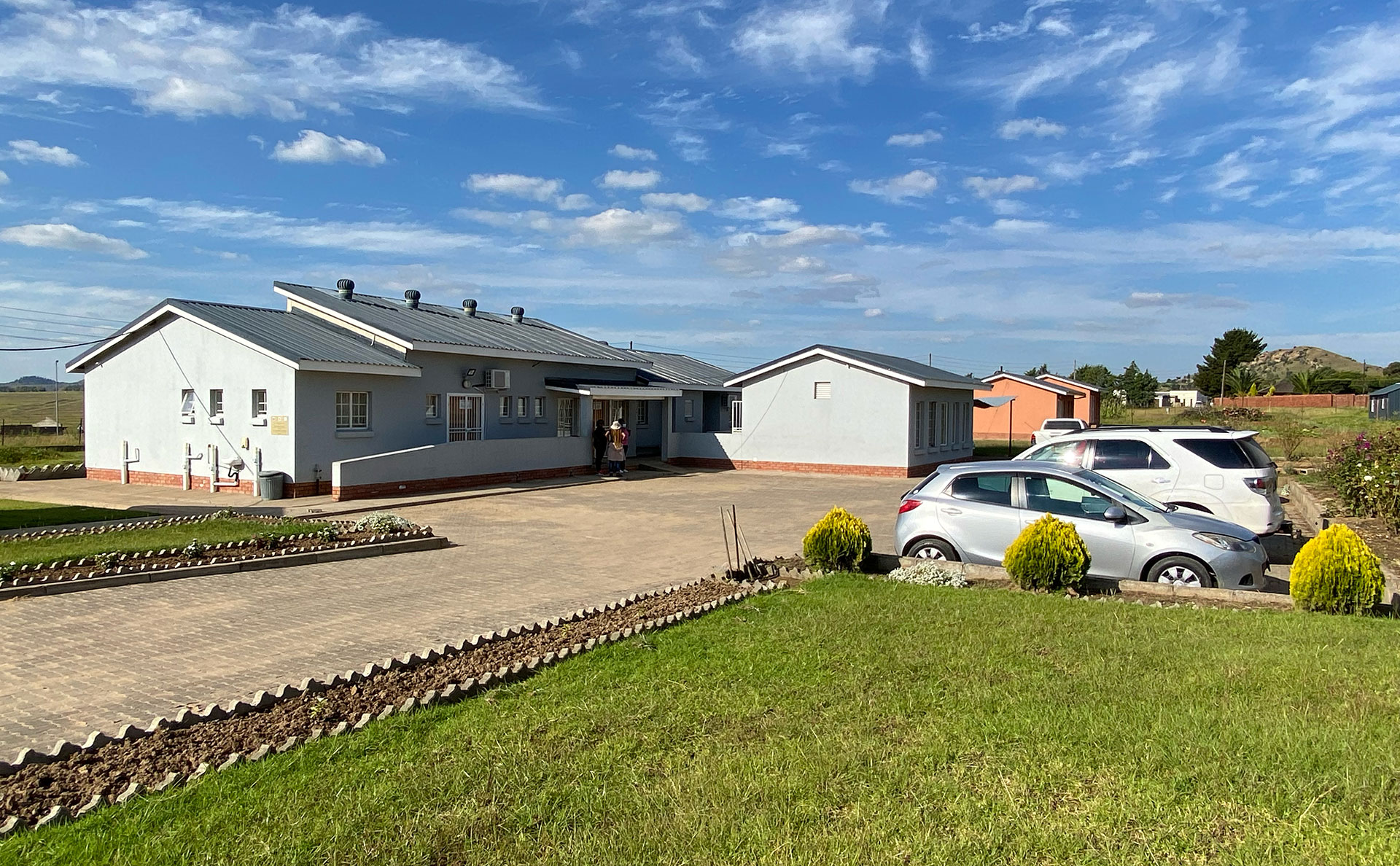
MCC
In May 2022, Lesotho Minister of Foreign Affairs and International Relations, the Honorable Matsepo-Molise Ramakoae (right), and Millennium Challenge Corporation Chief Executive Officer, Alice Albright, signed the $300 million Lesotho Health and Horticulture Compact in Maseru, Lesotho.
Of all the challenges facing women around the globe, perhaps none of them is more serious than gender-based violence (GBV). GBV is a direct attack on the security, health, and dignity of those who survive it, causing lasting damage wherever it occurs.
Lesotho has one of the highest rates of GBV in the world. Over 86% of women in Lesotho have experienced some form of violence in their lifetime, and 40% of men admitted to having perpetrated violence against women. The consequences are profound. GBV fuels already high rates of HIV and can result in severe physical and mental injuries. Additionally, the daily threat of violence can be an obstacle to securing an education, traveling outside of the home, attaining employment, and even accessing critical services such as healthcare.
All these steep human impacts have tangible economic implications. A study by the Commonwealth estimated that the economic burden of violence against women and girls in Lesotho costs the nation the equivalent of 5.5% of GDP.
While developing the Lesotho Health and Horticulture Compact—a $322 million grant comprised of $300 million from the American people and $22 million from the Government of Lesotho—MCC and the Government of Lesotho found the systemic and institutionalized gender discrimination in Lesotho limits Lesotho’s economic growth. Gender discrimination— perpetuated and reinforced by pervasive violence against women—was hurting women and hurting the national economy.
To address this, the compact developed three projects—Health Systems Strengthening (HSS), Market-Driven Irrigated Horticulture (MDIH), and Business Environment and Technical Assistance (BETA)—that all address GBV in different ways. In fact, the evidence on the links between GBV and economic growth led MCC to calculate the economic returns of proposed counter-GBV project activities in its Economic Rate of Return (ERR) analysis for the HSS Project—the first of its kind at MCC.

MCC
The Little Flower Health Center is one of the clinics built through MCC’s previous compact investment in Lesotho. Prior to this clinic, nurses worked through “borrowed houses” and had no space to store antiretrovirals and other important medications.
Supporting the Government of Lesotho’s fight against GBV by investing in the healthcare system is critical. For many survivors, healthcare workers are the first and often only source of formal assistance they access. MCC’s previous compact with Lesotho increased access to basic healthcare for hundreds of thousands of families across Lesotho by building or improving 138 health clinics, and training nearly 200 health practitioners in infection, prevention, and disease control. Now, in this new partnership, the compact is investing $75.4 million in the health sector with a significant focus on integrating robust counter-GBV services in the primary healthcare system.
In the clinical setting, MCC will invest in enhanced standard operating procedures and clinical practice guidelines for GBV treatment and referral, healthcare worker training programs, capacity building for district health management teams, and modernized health information system for confidential data collection, patient tracking, and improved planning. The HSS Project will additionally support the Government of Lesotho’s GBV prevention efforts through social and behavior change outreach and will work with a range of actors on the implementation and dissemination of the Counter-Domestic Violence Act, passed by the Government of Lesotho in 2022.
Addressing GBV is also important in MCC’s Market-Driven Irrigated Horticulture Project (MDIH) in Lesotho, which will strengthen women’s land rights and business opportunities in irrigated commercial horticulture. In societies with high levels of GBV, promoting land rights and putting new economic resources under the control of women can heighten GBV risks. The HSS and MDIH projects will thus work in tandem on GBV prevention, through outreach and education, as well as through use of a methodology with smallholders, such as the Gender Action Learning System, that promotes understanding of how increasing gender equality in business improves the economic well-being of entire households.
MCC remains dedicated to unlocking the economic potential of women in a holistic, sustainable, and impactful manner. Joining the fight against GBV in Lesotho is just one more way MCC is working to empower women around the world in an effort to reduce poverty through economic growth.

